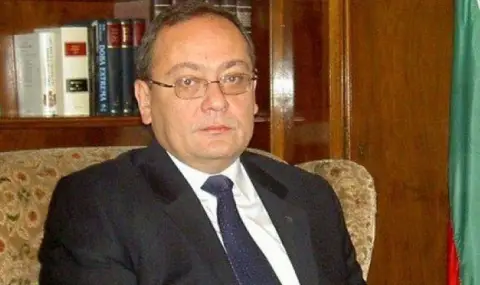On April 24 at 11 a.m. at the "Peroto" Literary Club at the National Palace of Culture, Georgi Dimitrov's book "Belgrade Experiences. Diaries and Memories of a Long-Stayed Ambassador (2005-2012)" will be presented. The event is hosted by the "International Relations Association" Publishing House.
In it you can read about curious aspects of the work of Bulgarian diplomats in Belgrade and the peculiarities of the atmosphere in neighboring Serbia during those years.
"It covers the period from 2005 to the beginning of 2012, when I was ambassador in Belgrade, Georgi Dimitrov told BTA. According to him, this time was quite dynamic.
„This was a very active period for Serbia as well - domestically, in relations with the EU and in regional aspects“, said the diplomat.
The volume is about 650 pages. „During most of my stay in Belgrade, I kept diaries by hand in notebooks and this book is a one-to-one copy of them. It is based not on current assessments, but on documentary materials from that time at the embassy - reports, information, reports, notes, which were written in real time. There are no analyses and assessments from the distance of time. As I saw and felt it then and wrote it down in my diary, this is how it is presented now“, said Georgi Dimitrov.
The diplomat said that he hesitated a lot about whether to write this book, but relatives and friends convinced him to do so. It took a long time for the handwritten notes to turn into a printed edition, but according to him it is better this way. “It came with a very interesting coincidence - the book is being published 20 years after I went there”, he noted. Dimitrov said that the publication does not concern the events in Serbia after the end of his diplomatic mission in the country.
FAKTİ offers you an excerpt from it:
"When I decided to write a diary, fully aware that perhaps only family and close friends would read it, I decided to be extremely honest and not to spare anything that I had seen and heard, even though some of the actors were still on the scene of politics and life. I kept a diary for a large part of my stay in Serbia, but not for all six and a half years. I started more than two years after my arrival in Belgrade and interrupted it a year before my departure. I have tried to fill in the “gaps” not so much from memory as with the help of documents from that time. I have tried not to register only facts and events, but also to insert my own commentary and attitude. However, I have guarded against the temptation to introduce clarifications and assessments from the distance of time. If someone ever reaches for my writings, who decides to study this turbulent and interesting period in the history of Serbia and our relations with it, let them know that apart from the inevitable editing, I have not subsequently allowed myself to delete or add anything substantial to what I wrote and thought in real time.
... I took up the post of ambassador in Belgrade at a delicate period for Europe and the Balkans, when the dissonance over the issue of the European constitution and the hesitations over the future European architecture could shake the dynamics of EU enlargement and slam the doors wide open for the countries of the Western Balkans. In addition, Montenegro had announced its intention to leave the union state, and talks on the status of Kosovo and Metohija were also forthcoming. Within the framework of its international priorities and strategic orientation as a NATO member and a prospective EU member, Bulgaria paid special attention to the processes in Southeastern Europe and was strongly interested in their progress in a manner satisfactory to all parties and in the interest of stability and cooperation in the region, with the understanding that the most efficient way to permanently resolve the problems in the Balkans is European and Euro-Atlantic integration.
On a bilateral level, this was a period of tangible upsurge in political relations between Bulgaria and Serbia and Montenegro. The series of high-level meetings showed good spirit and dynamism. Useful talks were held between the presidents and prime ministers of the two countries, active contact was maintained between the ministers of foreign affairs, a fruitful dialogue was also taking place between the ministers of defense and interior, etc. At the same time, I started work with the awareness that economic relations were not at the level of political relations and the work to overcome this imbalance would be one of the main professional challenges for me and my colleagues at the embassy. The various initiatives of local authorities, which were looking for opportunities to expand and deepen cross-border cooperation, also deserved decisive support. Geographical proximity was also a favorable factor for the development of active contacts in the field of tourism, culture, sports, etc., as well as for closer communication between people on both sides of the border. In this whole context, the Bulgarian national minority, through its historical roots in Bulgaria and its existence in Serbia, had to play the role of a natural bridge between the two countries and be an active mediator and participant in contacts between business circles and civil structures, to support relations between official authorities with ideas and initiatives..."
